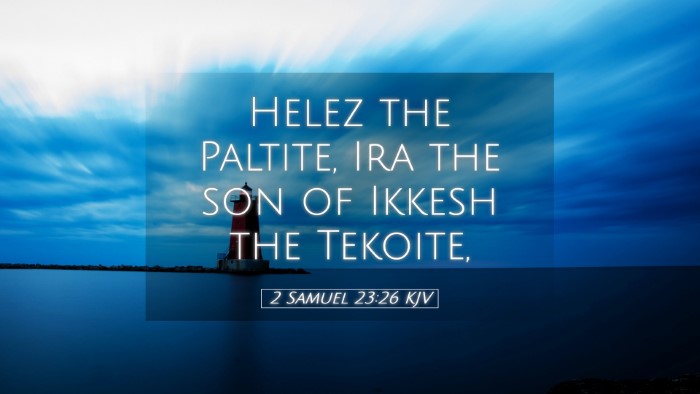Commentary on 2 Samuel 23:26
Verse (2 Samuel 23:26): "Heard of the mighty men, the twelve titled warriors of David, that was Adina the son of Shiza, the son of the Maachathite."
Introduction
The passage in 2 Samuel 23:26 is part of a broader listing of David's mighty men, emphasizing their bravery, loyalty, and the remarkable feats they accomplished during David's reign. This verse highlights one specific warrior, Adina, and provides insight into his character and the fidelity that defined David's circle of champions. A thorough examination of this verse, alongside insights from notable public domain commentaries, can yield a wealth of understanding for pastors, theologians, and students of Scripture.
Contextual Background
The final chapter of 2 Samuel commemorates David’s reign as king of Israel and reflects on his military successes and the esteemed warriors who fought for him. The list of mighty men serves both a historical and theological purpose, as it underlines God’s providence in establishing David's rule. These warriors are not mere soldiers but rather exemplars of what it means to be loyal and courageous in pursuit of God's calling.
Insights from Ancient Exegetes
Matthew Henry: In his commentary, Henry emphasizes the significance of loyalty showcased in the mighty men. He suggests that their titles are reflective of not just their achievements but their character. Adina is singled out as a notable figure whose lineage from Maachah represents strength and valor. Henry points out that these men were not just warriors; they inherited the spirit of true servitude, having risen through trials to stand beside the king. The mention of their names memorializes their commitment to David, serving as an inspiration to believers about the virtues of faithfulness and bravery.
Albert Barnes: Barnes expounds on the historical relevance of Adina, who is acknowledged for leading a significant charge against the Philistines. He emphasizes that the details surrounding his lineage and accomplishments encourage believers to remain steadfast in their faith and service to God. Barnes posits that the narrative captures a moment of historical valor, and by retelling these stories, it encourages congregants to emulate such mighty acts of faith. He also highlights the significance of the term “Mighty Men” as a portrayal of God’s mighty deliverance through unlikely vessels.
Adam Clarke: Clarke elaborates on the identity of Adina, providing etymological insights into his name and how it may signify "delicate" or "dainty." Clarke posits that despite the gentility associated with Adina's name, he was a fierce warrior. This duality is common among the heroes of scripture, illustrating the depth and complexity of character that God often uses in His service. Clarke emphasizes that physical attributes do not determine one’s capability but rather, it is one’s faith and divine calling that enable great accomplishments. He positions Adina’s example as a testament to strength arising from reliance on God.
Theological Implications
- Faithfulness: The narrative of David's mighty men reflects a profound commitment to honor and loyalty. Their bravery serves as a calling for all believers to pursue their God-given tasks with dedication.
- Community of Believers: The list of mighty men indicates that no single individual stands alone. The emphasis on community highlights that God's work is often accomplished through collective effort and support.
- Divine Strength: The might of these men illustrates that true strength comes from God. It conveys the message that God equips those He calls, regardless of their natural abilities or backgrounds.
- Legacy of Service: By memorializing these warriors, the text invites reflection on the legacies we build in our faith communities. It challenges individuals to consider how they are remembered within their own communities of faith.
Practical Applications
For pastors and leaders, the example of Adina and the mighty men encourages fostering a sense of loyalty and commitment among those they lead. Here are several practical applications:
- Encouraging Loyal Service: Teaching congregants about the importance of loyalty to God and to the church reflects the spirit of David's mighty men.
- Building a Community: Emphasizing collective experiences and shared missions within the church can strengthen unity as seen in David's army.
- Molding Character: Highlighting that individuals may possess diverse backgrounds yet can rise to be champions in God’s work encourages personal growth and resilience.
Conclusion
2 Samuel 23:26 serves as a reminder of God’s sovereignty and the individuals He raises to fulfill His purposes. The mighty men of David, particularly Adina, exemplify the ideals of courage, dedication, and community support. By studying these verses, believers are encouraged not only to reflect on their lives but to imbue their actions with a sense of purpose aligned with God’s calling. Understanding the historical and theological implications held in these narratives enriches the experience of those committed to Scripture and nurtures a vibrant faith community.


